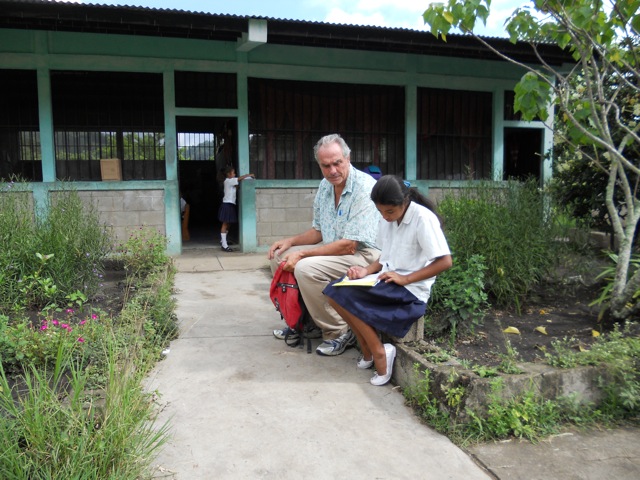Honduras Trip Reports – December 2018 and February 2019

Two trips were made to Honduras this winter, one in December to help celebrate the second high school graduation from ICSM, the other to welcome new students to the school year starting February 1st. Of course, plenty of challenges presented themselves: political, social, and environmental on each trip. Here are the highlights.
SCHOOL
In November we celebrated our second high school graduation with 16 students making it through all six grades. It was, again, a very joyous occasion with five villages represented, and hundreds of well wishers on hand. None of the parents had attended school through the 6th grade – many are illiterate – so this celebration marked an especially important date in their lives.
In February we began our 8th year. We have a record number of lower school students – 30 in the 7th grade alone – which bodes well for the future. There has been some attrition at the high school level for reasons that are beyond our control. But right now we have a school population of 110 spread over 6 grades so we are in good shape.
The drought, and the subsequent loss of two consecutive crops, has put enormous pressure on the communities we serve. Our response has been to offer full scholarships to every student, as well as the purchase of uniforms, shoes, books, etc. for all. As well, we have opened up a kitchen on school grounds to feed the poorest of the students. Many of these kids walk 1 1/2 hours to school each way, and on empty stomachs. We expect the food program to continue to expand from breakfast into lunch.
Our school is much better provisioned than any other in the region. We continue to attract students from some distance in part because of the food program, partly because of the scholarships, and partly because of the security. All of these “away” students are put up by local families at no charge. But as more kids come our way, we will have to find ways to house them which are fair to all.
One present problem is transportation. We have over 35 students coming as far away s Chaquite – a 1 1/2 hour walk – and we need to find some sort of transportation if we hope to attract more students. As well, we have students coming by motorcycle and bus, and those costs we must assume as well. But the bottom line is that families want their kids to have an education no matter the hardship of getting to school.
We have graduated 34 students over the past two years. 7 boys have found work in the textile mills in the city, one girl joined the army, and another is attending nursing school on weekends in a nearby town. Without a high school diploma, none of these jobs would have been available. Also, basic computer skills and some English have really helped. We continue to help students look for opportunities away, but it is very difficult if one has no phone – most don’t – or no extended family members near the factories. Getting students to enroll, keeping them in school, and then providing work afterward is a daunting task.
We took a truck load of recent grads to Cholomo to inspect the factories, and to meet the kids who had proceeded them. It was a helpful trip, and one that will encourage more grads to make a very challenging decision.
THE ENVIRONMENT
The recent drought, and general unpredictability of what rain there is, has wreaked havoc throughout rural Honduras. Where we are crops have failed, as mentioned above, creating a tenuous social fabric. The extreme heat has meant that 1,000 mahogany saplings from the village/TCI plantation have died. Also, the extreme heat brought to our coffee plantation a fungal infection that defoliated 80% of the trees. And while most of them should survive, there will be much less work for the pickers come fall. Another problem is that farmers have turned to burning the remaining forest in order to make charcoal – an environmentally disastrous decision, but one that seemingly can’t be helped.
ANCILLARY PROGRAMS
- Solar lights: We continue to sell solar lights- heavily discounted- over a far ranging geography. Sales are down given the economy, but the lights are vastly superior to candles, which are also getting too expensive to purchase.
- Truck: We are realizing that we should be looking into buying a pick up truck, not just for our visits ( we rent them at present), but for the general well being of the community: sick people to the hospital, crops to market, kids to school, etc.
- Fence: We need a fence around the school to keep animals out, but also to offer some sense of security to our students and teachers, especially at night when there special programs: movies, dances, etc.
THE FUTURE
We need to take a hard look at incorporating the adjacent primary school, government owned, but in shabby condition. We need to look into a possible high school merger with the Hacienda de Vieja school, which has few kids and is in risk of losing their teachers from lack of funding. We need to be more actively engaged in recruiting kids, talking to parents, and keeping the students we do have in school. The temptations to leave are growing. I will return in April to address these problems, and hope to provide more opportunities for our graduates to leave. A tall order!
We remember how desperate El Rosario was before the school. We know how proud the townspeople are of the education their children receive. We will persevere in the face of strong winds to make the Locomapa Valley a secure sanctuary for those who want to stay on the land, who want their kids educated, and who want to simply live in peace with enough food to sustain themselves.
